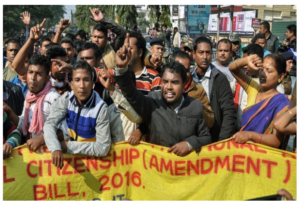UPSC Articles
POLITY
TOPIC: General Studies 2:
- Indian Constitution- historical underpinnings, evolution, features, amendments, significant provisions and basic structure
Citizenship (Amendment) Bill 2019 passed the lower House test

Daily Current Affairs IAS | UPSC Prelims and Mains Exam – 10th December 2019
Context:
The Citizenship (Amendment) Bill 2019, that seeks to give Indian nationality to non-Muslim refugees from Pakistan, Bangladesh and Afghanistan passed the lower House test.
Background:
- Amend the definition of illegal immigrant for Hindu, Sikh, Parsi, Buddhist and Christian immigrants from Pakistan, Afghanistan and Bangladesh, who have lived in India without documentation.
- They will be granted fast-track Indian citizenship in six years. (12 years of residence has been the standard eligibility requirement for naturalisation)
Eligiblity:
- Applies to the people who were forced to seek shelter in India due to persecution on the ground of religion”.
- The cut-off date was December 31, 2014, which means the applicant should have entered India on or before that date.
- Indian citizenship, under present law, is given either to those born in India or if they have resided in the country for a minimum of 11 years.
- The Bill also proposes for the cancellation of Overseas Citizen of India (OCI) registration where the OCI card-holder has violated any provision of the Citizenship Act or any other law in force.
Govt stand and criticism:
- Centre says these minority groups have come escaping persecution in Muslim-majority nations. However, the logic is not consistent – the bill does not protect all religious minorities, nor does it apply to all neighbours.
- The Ahmedia Muslim sect and even Shias face discrimination in Pakistan. Rohingya Muslims and Hindus face persecution in neighbouring Burma, and Hindu and Christian Tamils in neighbouring Sri Lanka.
- The government responds that Muslims can seek refuge in Islamic nations, but has not answered the other questions.
Exceptions in the bills:
- CAB won’t apply to areas under the sixth schedule of the Constitution – which deals with autonomous tribal-dominated regions in Assam, Meghalaya, Tripura and Mizoram.
- The bill will also not apply to states that have the inner-line permit regime (Arunachal Pradesh, Nagaland and Mizoram).
How is it different from NRC(National register for citizens)?
- The National Register of Citizens or NRC that we saw in Assam targeted illegal immigrants.
- A person had to prove that either they, or their ancestors were in Assam on or before March 24, 1971.
- NRC, which may be extended to the rest of the country, is not based on religion unlike CAB.
Why so much opposition?
- The CAB discriminates Muslim identity by declaring India a welcome refuge to all other religious communities.
- It seeks to legally establish Muslims as second-class citizens of India by providing preferential treatment to other groups.
- This violates the Constitution’s Article 14, the fundamental right to equality to all persons.
- This basic structure of the Constitution cannot be reshaped by any Parliament.
Conclusion:
- India was not created on the basis of religion, Pakistan was. Only the Muslim League and the Hindu Right advocated the two nation theory of Hindu and Muslim nations, which led to Partition.
- All the founders of India were committed to a secular state, where all citizens irrespective of religion enjoyed full membership.
Connecting the dots:
- Citizenship law amendment goes against non-discriminatory norms in the Constitution. Critically Analyse











